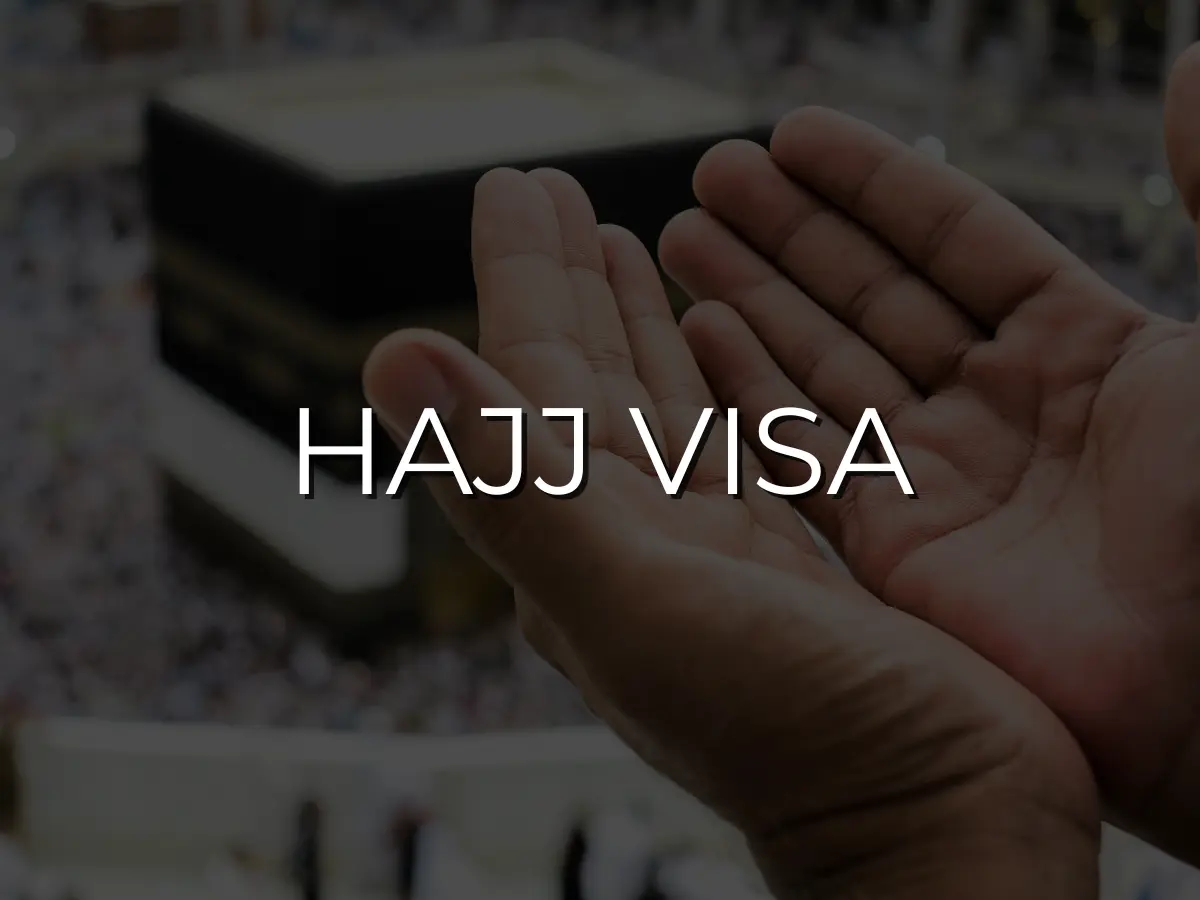
Hajj is one of the Five Pillars of Islam and is mandatory once in a lifetime for Muslims who meet specific conditions. This guide provides essential information for preparing your Hajj pilgrimage in 2026. If you need assistance with your Saudi Arabia visa application, our team is here to help.
When is Hajj 2026? Important Dates
The Islamic pilgrimage follows the lunar calendar. Based on current predictions, Hajj 2026 will begin around May 24-25, 2026.
Key Dates for Hajj 2026:
- Start of Dhul Hijjah: Approximately May 18, 2026
- Day of Arafah: Expected May 25, 2026
- Eid al-Adha: Anticipated May 26, 2026
- Main Rituals: May 24-28, 2026
- Pilgrim Arrivals Begin: April 18, 2026
These dates depend on moon sighting, so Saudi authorities will confirm the exact schedule closer to the time.
Application Deadlines:
For Pakistani pilgrims, early registration started in July 2025. International pilgrims using the Nusuk platform should complete registration before March 2026 to ensure visa processing.
Who Can Perform Hajj?
The pilgrimage is mandatory for Muslims who meet these conditions:
- Physically fit to handle the journey
- Financially stable with enough resources
- Mentally capable of performing the rituals
- Safe travel route to Saudi Arabia
- Adult age (reached puberty)
Important 2026 Restrictions:
Age Requirement: Children under 12 years old are NOT permitted to participate in Hajj 2026 as per Saudi Government directives.
Women Pilgrims: No Mehram (male guardian) is required for women performing Hajj 2026. Women can travel if they submit an affidavit stating:
- Parents or husband permit them to travel
- They join a group of reliable females
- Their dignity faces no threat during the journey
Special Needs Pilgrims: Disabled or special citizens must travel with an attendant.
Starting Your Hajj Registration
For Pakistani Pilgrims:
Pakistani citizens have two main options:
Option 1: Government Hajj Scheme
- Apply through 14 scheduled banks across Pakistan
- Applications processed on first-come, first-served basis
- Choose between long package (38-42 days) or short package (20-25 days)
Option 2: Private Hajj Scheme
- Book through registered Dependent Hajj Companies (DHCs)
- Private scheme capped pilgrims for 2026
For International Pilgrims (UK, USA, Canada, Europe):
Register through the Nusuk Hajj Platform – the official Saudi portal:
- Step 1: Visit Nusuk website and create your account
- Step 2: Complete profile with passport details
- Step 3: Browse and select approved Hajj packages
- Step 4: Make payment through secure platform
- Step 5: Track application status online
Essential Documents Required:
- Valid passport (must remain valid until at least November 26, 2026)
- Recent photographs (passport size)
- Vaccination certificates (meningitis ACWY strain is mandatory)
- Proof of relationship (for traveling with family)
- Financial documents (showing ability to afford the trip)
- Bank account details (for Pakistani applicants)
Your passport must remain valid for at least six months after your return date.
Hajj Visa Requirements
Visa Application Process for Pakistani Pilgrims:
- Step 1: Submit application through banks or online portal
- Step 2: Wait for selection (first-come, first-served basis)
- Step 3: Pay Hajj dues in installments once selected
- Step 4: Complete medical checkups and vaccinations
- Step 5: Receive visa automatically once approved (processed between February-March 2026)
Visa Application Process for International Pilgrims:
- Step 1: Create account on official Nusuk portal
- Step 2: Fill out personal information carefully
- Step 3: Upload required documents
- Step 4: Select preferred Hajj package
- Step 5: Pay registration fee
- Step 6: Wait for verification and approval
Mandatory Visa Requirements:
- Vaccination Proof: Meningitis ACWY vaccine is mandatory
- COVID-19: Requirements may apply (check latest guidelines)
- Digital Wristband: All pilgrims must wear digital wristband for safety tracking
- No Previous Hajj: Most countries require you haven’t performed Hajj in last 5 years
Health and Vaccination Requirements
Saudi authorities require specific vaccinations:
- Meningitis vaccine (ACWY strain) – Mandatory
- COVID-19 vaccination (requirements may vary)
- Seasonal flu shot (recommended)
- Polio vaccine (for certain countries)
Carry personal medications and copies of prescriptions. Terminally ill patients are not permitted to proceed for Hajj.
The Five Days of Hajj: Simple Breakdown
Day 1 – 8th Dhul Hijjah: Journey to Mina
Pilgrims enter the state of Ihram and travel to Mina. Spend the day in prayer and preparation.
Day 2 – 9th Dhul Hijjah: Day of Arafah
The most important day. Pilgrims gather at Mount Arafat from dawn until sunset, making sincere supplications. This day represents the core of Hajj.
Day 3 – 10th Dhul Hijjah: Eid al-Adha
After leaving Arafat, pilgrims collect pebbles at Muzdalifah. Next morning, stone the largest pillar at Jamarat, perform animal sacrifice (through Saudi Government program only), cut hair, and complete Tawaf al-Ifadah around the Kaaba.
Day 4 & 5 – 11th & 12th Dhul Hijjah: Remaining in Mina
Stay in Mina for two or three more days. Each day, stone all three pillars. Depart once rituals are complete.
Essential Hajj Rituals Explained
Tawaf: Circling the Kaaba
Walk around the Kaaba seven times counterclockwise while making prayers. This ritual symbolizes unity of believers.
Sa’i: Walking Between Hills
Walk seven times between Safa and Marwah hills. This commemorates Hajar’s search for water for her son Ismail.
Stoning the Pillars (Rami al-Jamarat)
Throw pebbles at three pillars. This represents rejecting evil and following Prophet Ibrahim’s example.
Halq or Taqsir: Hair Cutting
Men shave their heads or trim hair short. Women cut a small portion of hair. This symbolizes renewal and humility.
Qurbani: Animal Sacrifice
Important: Sacrifice (Qurbani) through KSA Government Adahi program is compulsory. No private sacrifice is allowed.
What to Pack for Your Journey
Clothing Essentials:
For Men:
- White Ihram cloths (at least 2 sets)
- Comfortable sandals
- Regular modest clothing for after Hajj
For Women:
- Modest, loose-fitting clothes
- Comfortable shoes
- Headscarf (hijab)
- Prayer dress
Other Important Items:
- Personal hygiene products (unscented preferred)
- First aid kit with basic medicines
- Money belt for documents and cash
- Reusable water bottle
- Small prayer rug
- Dua book in your language
- Phone charger and power bank
Staying Safe and Healthy
Heat Management
Saudi Arabia can be extremely hot. Drink plenty of water throughout the day. Use umbrella for shade when walking.
Crowd Safety
Millions attend Hajj simultaneously. Stay aware of surroundings. Never push in crowded areas. Designate meeting points with your group.
Health Precautions
Wash hands frequently. Wear masks when needed. Rest adequately between rituals. Seek medical help immediately if feeling unwell.
After Hajj: Visiting Medina
Most pilgrimage arrangements include time in Medina. This blessed city houses Masjid an-Nabawi, the Prophet’s Mosque.
What to Do in Medina:
- Pray at the Prophet’s Mosque
- Visit Jannat al-Baqi cemetery
- See historical Islamic sites
- Rest and reflect on your journey
Technology and Modern Hajj
Essential Apps for Hajj 2026:
For All Pilgrims:
- Nusuk App: Official portal for permits, services, and Riyaz ul Jannah booking
- Tawakkalna: Health requirements and entry verification
- Haramain: Prayer times, Qibla direction, and navigation
- Translator apps: Communication in Arabic
- Compass apps: Finding Qibla direction
For Pakistani Pilgrims:
- Pak Hajj App: Official app by Ministry of Religious Affairs
- Register complaints
- Track group location
- Access daily situation reports
- Get emergency assistance
- Receive important updates
Digital Wristband Technology:
All pilgrims must wear a digital wristband throughout Hajj 2026. This device:
- Tracks location for safety
- Contains medical information
- Helps authorities assist during emergencies
- Identifies you at checkpoints
- Cannot be removed during pilgrimage
Common Mistakes to Avoid
- Delaying registration until last minute
- Forgetting to check passport validity (must be valid until November 26, 2026)
- Packing heavily scented products (not allowed in Ihram)
- Arguing or fighting during pilgrimage
- Neglecting rest and becoming exhausted
- Losing important documents
- Not staying hydrated in intense heat
- Applying without required vaccinations completed
- Forgetting digital wristband compliance
- Attempting private Qurbani (only government program allowed)
Application-Specific Mistakes:
For Pakistani Applicants:
- Missing bank application deadlines
- Incomplete documentation submission
- Not checking first-come, first-served status
For International Applicants:
- Account verification errors on Nusuk
- Uploading incorrect document formats
- Payment rejection due to card issues
Special Tips for First-Time Pilgrims
Before Departure:
- Learn the basics through reliable sources
- Watch tutorial videos
- Attend preparation classes
- Start walking daily to build stamina
- Practice wearing Ihram at home
- Increase prayers and Quran recitation
- Seek forgiveness from people you may have wronged
During Hajj:
- Stay patient despite crowds and heat
- Follow group leader guidance
- Don’t wander off alone
- Keep intentions pure
- Help fellow pilgrims when possible
Final Preparations Checklist
Three Months Before:
- Confirm booking and payments
- Attend Hajj training sessions
- Get required vaccinations
- Purchase travel insurance
One Month Before:
- Pack bags (check airline weight limits)
- Exchange currency
- Inform bank about travel
- Photocopy important documents
One Week Before:
- Reconfirm flight details
- Check weather forecast
- Review Hajj rituals
- Spend quality time with family
Conclusion
Performing Hajj represents a blessed opportunity. Start planning today. Register early. Prepare both physically and spiritually. Keep your intention pure.
For visa services and Hajj information, visit ksavisa.com where we help pilgrims with their journey.
Frequently Asked Questions
When can I apply for Hajj 2026?
Pakistani applicants can apply through government scheme banks now (registration started July 2025). International pilgrims should register on Nusuk platform immediately, with visa processing beginning February 2026.
What is the Hajj quota for Pakistan in 2026?
Total Pakistan quota will be announced by Saudi Arabia soon. Private scheme is capped at 60,000 pilgrims. Additionally, hardship quota of 1,000 seats is reserved for special cases. Armed forces receive 1,500 seats.
Do women need a Mehram for Hajj 2026?
No. Women can travel without Mehram as per Council of Islamic Ideology 2023 decision. They only need to submit affidavit confirming family permission and traveling with reliable females.
Can children perform Hajj 2026?
Children under 12 years old are NOT permitted for Hajj 2026 as per Saudi Government rules. Children above 12 can accompany parents but must perform Hajj again after reaching adulthood.
Can I do private Qurbani (animal sacrifice)?
No. Only Saudi Government Adahi program is allowed. Private sacrifice is strictly prohibited for all pilgrims.
Is the digital wristband mandatory?
Yes, all pilgrims must wear digital wristband throughout their Hajj journey for safety tracking and identification.
Can overseas Pakistanis apply for Hajj 2026?
Yes. Overseas Pakistanis can book through registered Dependent Hajj Companies by depositing Hajj dues in foreign exchange through banking channels. They can also apply under government scheme.
What happens if my visa is rejected?
Check the reason and reapply if possible. For Pakistani applicants, funds may be refunded according to Ministry guidelines. International applicants should contact their package provider.
Can I perform Hajj if I’m pregnant?
Consult your doctor first. Pregnancy makes you exempt from the obligation until you’re able.
What if I miss a ritual?
Some missed rituals require compensation (dam). Consult a scholar for specific guidance.

